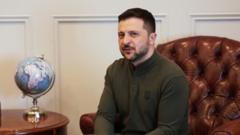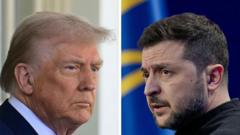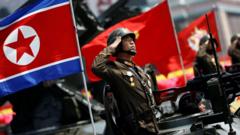The recent parliamentary elections signal a notable change as Germany braces for an uncertain economic landscape and evolving international relations.
Friedrich Merz Emerges as Potential Chancellor of Germany Amidst Rising Tensions

Friedrich Merz Emerges as Potential Chancellor of Germany Amidst Rising Tensions
A shift towards conservative leadership in Germany raises questions about future political alliances and economic policy.
In a significant shift in German politics, citizens voted overwhelmingly in favor of the centrist conservative bloc during Sunday’s parliamentary elections, propelling Friedrich Merz, head of the Christian Democratic Union (CDU), towards the likelihood of becoming the next Chancellor. This election, called prematurely due to the collapse of Olaf Scholz's coalition, positions Merz to potentially reshape Germany's economic and foreign policy amidst President Trump's controversial reign.
Merz, addressing supporters in Berlin, expressed confidence in swiftly assembling a governing coalition, hinting at a stronger German presence on the European stage. "We have won it," he declared, suggesting a robust plan to tackle issues of migration while implementing tax cuts and reducing regulations to spur economic revitalization. The election witnessed what seems to be the highest voter turnout in decades, indicating public dissatisfaction with the previous government’s approach to significant issues.
While Merz's platform includes a hardened stance on immigration, his foreign policy promises signal a recalibration as he looks to support Ukraine and redefine Germany's role in Europe against a backdrop of an unpredictable global order under Trump. His comments toward the campaign's end raised eyebrows when he questioned the integrity of U.S. democracy under Trump's leadership and criticized perceived interference favoring the far-right Alternative for Germany (AfD).
As Merz prepares to navigate coalition politics, the implications of Germany's election could reverberate through Europe, necessitating decisive action in response to shifting international alliances. The coming weeks will be critical as he works to solidify his power amid a landscape fraught with challenges.
Merz, addressing supporters in Berlin, expressed confidence in swiftly assembling a governing coalition, hinting at a stronger German presence on the European stage. "We have won it," he declared, suggesting a robust plan to tackle issues of migration while implementing tax cuts and reducing regulations to spur economic revitalization. The election witnessed what seems to be the highest voter turnout in decades, indicating public dissatisfaction with the previous government’s approach to significant issues.
While Merz's platform includes a hardened stance on immigration, his foreign policy promises signal a recalibration as he looks to support Ukraine and redefine Germany's role in Europe against a backdrop of an unpredictable global order under Trump. His comments toward the campaign's end raised eyebrows when he questioned the integrity of U.S. democracy under Trump's leadership and criticized perceived interference favoring the far-right Alternative for Germany (AfD).
As Merz prepares to navigate coalition politics, the implications of Germany's election could reverberate through Europe, necessitating decisive action in response to shifting international alliances. The coming weeks will be critical as he works to solidify his power amid a landscape fraught with challenges.






















